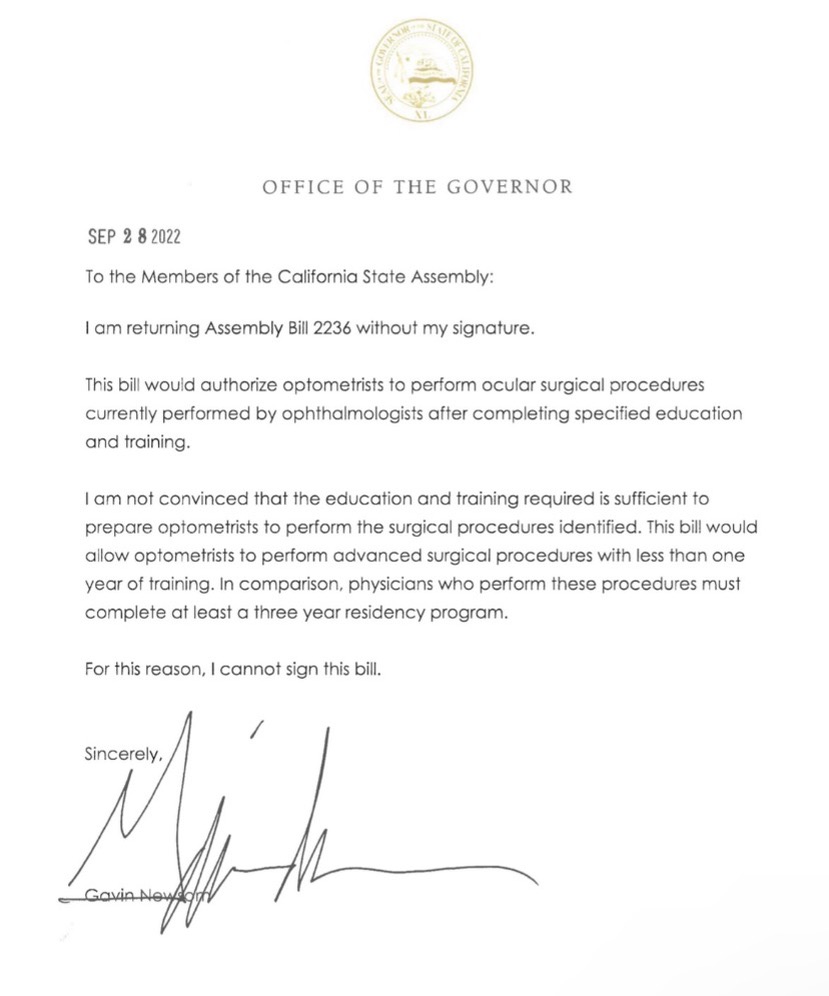Editor’s Note: As part of our “Year in Review” retrospective, we’ve selected the top 30 news stories of the year and are re-sharing them as we close out 2022. Follow along as we count down to number 1!
This story was originally published on September 29, 2022.
No. 27 biggest news story of 2022:
 |
|
Gov. Newsom wrote that AB 2236 would have allowed ODs to perform the same procedures with one year of training as ophthalmologists perform after three years of training. Click image to enlarge. |
Optometrists across the country woke up to some upsetting news this morning; after a long battle to get California’s scope expansion bill, AB 2236, to pass the state Senate four weeks ago, it was announced yesterday evening that Gov. Newsom has chosen to veto the bill. Had it been signed, the legislation would’ve granted the state’s ODs the authority to perform several advanced procedures including three types of laser surgery (SLT, capsulotomy, peripheral iridotomy), lesion removal, multiple types of injections and corneal crosslinking. The law also would have made California the 11th laser state and doubled the number of ODs in the country currently able to pursue such responsibilities.
In the governor’s letter defending his decision to veto the bill, he offered the following rationale: “I am not convinced that the education and training required is sufficient to prepare optometrists to perform the surgical procedures identified.” He wrote that AB 2236 would have allowed ODs to perform the same procedures with one year of training as ophthalmologists perform after three years of training.
However, Paul Karpecki, OD, associate professor at Kentucky College of Optometry at the University of Pikeville, points out that this simply doesn’t ring true for the specific procedures outlined in the bill.
“It appears the governor was misinformed,” says Dr. Karpecki. “While ophthalmology residents do spend three years in ophthalmic and surgical training, they don’t spend three years learning to perform non-invasive procedures like SLT. The bill was not attempting to have optometrists perform cataract surgery or other invasive intraocular surgeries” that comprise the bulk of residency and optional fellowship training. Dr. Karpecki adds, “I and many doctors of optometry in 10 states have provided these same procedures that California‘s House and Senate chose to approve, without harm and while greatly helping a significant unmet medical need.”
Nathan Lighthizer, OD, associate dean at NSU Oklahoma College of Optometry, also pushes back on Gov. Newsom’s argument against the bill. “Optometrists have four to five years of rigorous classroom, laboratory and clinical training on these procedures—not ‘less than one year of training’ as was stated in the governor’s veto announcement.”
The California Optometric Association, which has worked alongside lawmakers for several years to push the laser bill forward, is also feeling the frustration of the loss.
“We are devastated by the veto,” says Kristine Shultz, executive director of COA. “The public safety concerns are nonsense. AB 2236 contains the nation’s strictest standards for education and certification when optometrists seek to perform these procedures,” she points out. Like Dr. Karpecki, Ms. Shultz also notes that, “Other states have already expanded the list of procedures optometrists can perform without safety concerns materializing.”
The purpose of AB 2236, sponsored by Assemblymember Evan Low, was to expand eyecare access and services for thousands of residents in the Golden State. In a press release published by the COA proceeding last night’s upsetting loss, COA president Amanda K. Dexter, OD, wrote, “California optometrists sponsored AB 2263 to address a real and growing concern for our patients, particularly Medi-Cal enrollees, who face long waits for specialty care or go without needed health procedures.” She continued, “While we are deeply disappointed in this veto, we will keep pressing forward on a policy solution because the shortage of healthcare providers serving Californians with low incomes, rural communities and people of color will only grow worse without action.”
Despite the frustration felt today by advocates of optometric scope expansion, encouragement for the bill’s future can be gained from its recent triumph in the Senate. “We thank Asm. Low for his leadership and Asm. Wood, a strong voice for patient access,” Dr. Dexter wrote in the COA press release. “Thanks to these leaders, a strong, bipartisan majority of legislators of both parties agreed: highly trained optometrists can safely deliver advanced eye procedures our patients need, in their communities, from the providers they trust and who speak their language.”
As scope expansion battles for optometrists continue in many US states, ongoing effort must be put forward to educate and inform people and politicians on the safe and legitimate nature of these procedures, as well as on the ability of these laws to increase eye care access to underserved communities nationwide.
“I encourage the COA and its members to contact their legislators and continue to educate them on the importance of this bill,” says Dr. Lighthizer.

